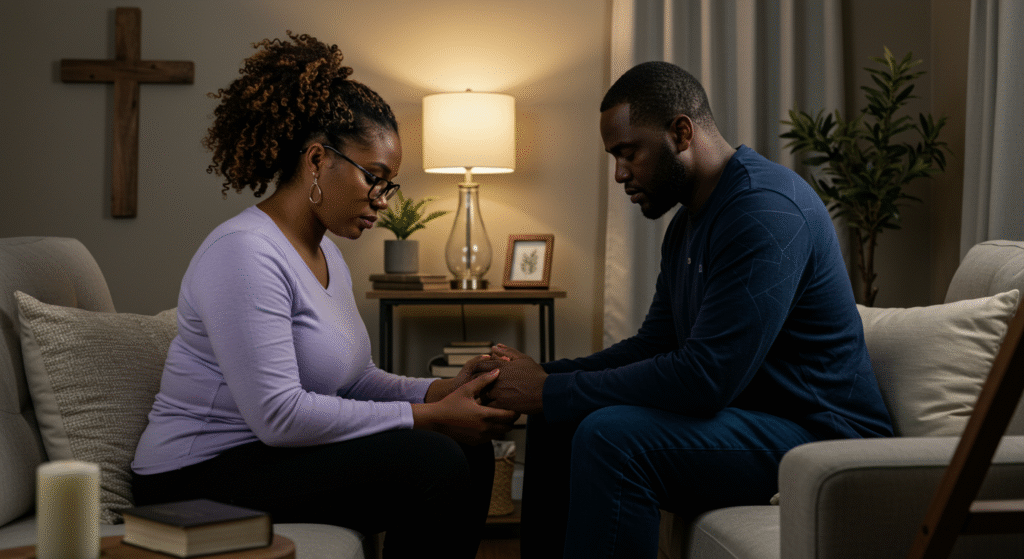When Blame Becomes a Weapon: Understanding Conflict in a Godly Marriage

Introduction
 Every couple disagrees—it’s part of life and growth. But what happens when those disagreements take a dark turn? When honest conversations about hurt become accusations, and when one spouse constantly walks on eggshells to avoid blame?
Every couple disagrees—it’s part of life and growth. But what happens when those disagreements take a dark turn? When honest conversations about hurt become accusations, and when one spouse constantly walks on eggshells to avoid blame?
In a healthy marriage, both partners take responsibility for their actions. But in a dysfunctional dynamic, blame can become a tool to deflect, control, or even punish. There’s a big difference between voicing real concerns and using blame as a weapon.
This post will help you:
- Recognize when blame is being used unfairly
- Understand the spiritual and emotional root behind it
- Respond with wisdom, love, and boundaries
- Stay rooted in God’s truth during difficult marital moments
Whether you’re the one being blamed or struggling with defensiveness yourself, this is your opportunity to invite clarity, healing, and God’s peace into your relationship.
1. The Nature of Blame in Marriage
 Blame is a defense mechanism. It shifts focus away from personal accountability and onto someone else. In marriage, it often looks like:
Blame is a defense mechanism. It shifts focus away from personal accountability and onto someone else. In marriage, it often looks like:
- “You’re just making things worse.”
- “If you were more loving, I wouldn’t act this way.”
- “Everything changed after you started doing X.”
Rather than addressing the core issue, blame creates a smokescreen. It turns one spouse into the villain and the other into the victim—even when the truth is more complex.
It’s especially painful in Christian marriages, where the expectation is love, grace, and unity. When blame dominates, it divides.
2. Honest Feedback vs. Weaponized Blame
 Not all criticism is unhealthy. In fact, Scripture encourages us to speak the truth in love (Ephesians 4:15). But there’s a clear distinction between:
Not all criticism is unhealthy. In fact, Scripture encourages us to speak the truth in love (Ephesians 4:15). But there’s a clear distinction between:
- Healthy confrontation: Rooted in love, humility, and a desire to grow together
- Weaponized blame: Rooted in insecurity, fear, or manipulation; used to shame or deflect
Here’s a side-by-side example:
| Healthy Confrontation | Blame as a Weapon |
| “When you said that, I felt hurt. Can we talk about it?” | “You never care about how I feel—this is all your fault.” |
| “I’m struggling with how we’ve been communicating. I’d love to find a better way.” | “You’re the reason we always fight.” |
The difference is tone, intention, and responsibility. Blame avoids self-reflection. Healthy communication invites it.
3. Why People Use Blame
 Blame often hides deeper emotional or spiritual wounds. A spouse may lash out not because of the issue at hand—but because of unresolved pain, fear, or unmet expectations. Some common root causes:
Blame often hides deeper emotional or spiritual wounds. A spouse may lash out not because of the issue at hand—but because of unresolved pain, fear, or unmet expectations. Some common root causes:
- Insecurity: They feel unworthy or inadequate and lash out to regain control.
- Fear of failure: Admitting fault feels too threatening to their identity.
- Unhealed trauma: Past experiences resurface, causing disproportionate reactions.
- Learned patterns: They grew up in a home where blame was the norm.
Understanding these roots doesn’t excuse the behavior—but it can help you depersonalize it. Blame isn’t always about you. Sometimes, it’s about what’s going on inside the other person.
4. How Blame Impacts the Marriage Dynamic
 Unchecked blame can slowly poison a marriage. Here’s how it typically plays out:
Unchecked blame can slowly poison a marriage. Here’s how it typically plays out:
1. Emotional Withdrawal
The blamed spouse becomes guarded, distant, or defensive. Trust breaks down. Conversations become unsafe.
2. Role Reversal
Instead of being equal partners, one person becomes the “accuser” and the other the “problem.” That imbalance creates resentment and loneliness.
3. Cycle of Guilt and Control
Blame traps both partners. One controls through accusations; the other complies out of guilt—until they eventually burn out or rebel.
4. Erosion of Intimacy
Blame breeds fear. Intimacy withers where fear lives. Vulnerability becomes too risky, and walls go up.
5. Responding with Wisdom, Not Reactivity
 When you’re on the receiving end of blame, it’s tempting to react with anger or retreat. But reacting in the flesh usually escalates the conflict.
When you’re on the receiving end of blame, it’s tempting to react with anger or retreat. But reacting in the flesh usually escalates the conflict.
Here’s how to respond with wisdom and grace:
1. Pause and Pray
Ask God to calm your emotions and reveal what’s really happening—both in you and in your spouse.
“Be quick to listen, slow to speak and slow to become angry.” — James 1:19
2. Validate What’s Real—Not What’s False
If there’s truth in what they’re saying, own it. But don’t accept exaggerated or manipulative labels. For example:
“You’re right, I didn’t follow through on that. I’m sorry.”
Not: “You’re right, I always ruin everything.”
3. Set Boundaries Around Disrespect
Boundaries are not punishments—they’re necessary to protect the relationship. You can say:
“I’m open to resolving this, but not if we’re going to attack each other.”
4. Don’t Try to Fix What Isn’t Yours
You are responsible for your actions—not for their reactions or healing journey.
6. When You’re the One Doing the Blaming
 If you recognize that you may be using blame in your marriage, this is not about shame. It’s about invitation—to healing, growth, and surrender.
If you recognize that you may be using blame in your marriage, this is not about shame. It’s about invitation—to healing, growth, and surrender.
Ask yourself:
- Am I blaming my spouse to avoid facing my own pain?
- Do I feel out of control unless I control the narrative?
- What wounds or insecurities are fueling this behavior?
Bring these questions to God. Let Him reveal the root and begin the healing process. Seeking counseling or spiritual mentorship is also a powerful step toward renewal.
“Search me, God, and know my heart; test me and know my anxious thoughts.” — Psalm 139:23
7. Speaking the Truth in Love
 Godly marriages are built not on perfection, but on humility and grace. Learning to speak the truth in love is one of the most powerful tools you can cultivate.
Godly marriages are built not on perfection, but on humility and grace. Learning to speak the truth in love is one of the most powerful tools you can cultivate.
Here are practical tips:
- Use “I” statements instead of accusations
(“I feel overwhelmed when I’m blamed for things I didn’t do.”)
- Be specific, not sweeping
(“Yesterday’s conversation really hurt” vs. “You always hurt me.”)
- Stay future-focused
(“How can we do this differently next time?”)
- Invite the Holy Spirit into every hard conversation
8. Letting God Be the Judge
 One of the hardest parts of being wrongly blamed is the feeling of injustice. You want to explain, defend, or “set the record straight.” But sometimes, God asks you to release that need.
One of the hardest parts of being wrongly blamed is the feeling of injustice. You want to explain, defend, or “set the record straight.” But sometimes, God asks you to release that need.
“The Lord will fight for you; you need only to be still.” — Exodus 14:14
Your job is not to win an argument—it’s to protect your peace, guard your heart, and stay aligned with truth. Let God deal with what you cannot control. He sees your heart. He knows your intentions. And He will bring justice in His perfect timing.
9. When Outside Help Is Needed
 There’s no shame in needing help. If blame has become the dominant tone in your marriage, especially if it’s leading to verbal abuse, gaslighting, or emotional control, it’s time to seek outside support.
There’s no shame in needing help. If blame has become the dominant tone in your marriage, especially if it’s leading to verbal abuse, gaslighting, or emotional control, it’s time to seek outside support.
Consider:
- A licensed Christian counselor
- A trusted pastor or mentor
- A marriage enrichment group or retreat
Sometimes healing requires a neutral voice who can help both partners see clearly.
Conclusion: Choose Truth, Not Toxicity
Marriage is a sacred bond—not a battleground. If blame has found its way into your relationship, it’s time to call it out—not with anger, but with grace and wisdom.
You were never meant to carry the burden of someone else’s unresolved pain. And you were never meant to weaponize your own wounds, either.
God calls both spouses to humility, love, accountability, and healing. The Holy Spirit can take even the most toxic patterns and replace them with truth, safety, and peace.
You don’t have to stay stuck in the storm of blame. With God’s help, you can walk in clarity and courage—one conversation, one prayer, one boundary at a time.


